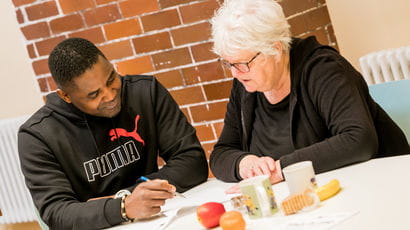Sheffield Hub mental health partnership
A case study on the Sheffield Hub.
The Sheffield Hub was led by the University of Sheffield (UoS), working closely with Sheffield Hallam University and the city’s multi-agency Psychology Board.
What was delivered
The Sheffield Hub tested the potential for increasing research and clinical resources for students by placing clinical academic staff, NHS-funded trainee clinical psychologists and Improving Access to Psychological Therapies (IAPT) trainees within a newly created university research clinic. This aimed to increase capacity, allowing for ongoing evaluation and improvement of care for students, and to bridge the gap between primary and secondary care with the provision of evidence-based interventions.
The Sheffield Hub’s top priorities were:
- to work collaboratively with NHS and third sector partners to help meet the demand of a broad spectrum of student mental health needs
- to work with trainee Clinical Psychology doctorate (DClinPsych students on placements to help train a new workforce that is trained and experienced with working with student needs
- to develop multidisciplinary teams involving members of staff who work across sectors.
The Sheffield Hub launched the new University Research Clinic in May 2020, with the University Counselling Service hosting two Trainee Clinical Psychologists. They are providing individual treatment and an online Dialectical Behaviour Therapy group online, developing an online therapeutic activity group for students in halls and carrying out engagement projects for marginalised students.
The University of Sheffield has established strong local links with Sheffield Hallam University and Sheffield’s multi agency Psychology Board, and the development of community mental health provision through the Sheffield Transformation Service (STS). The STS has enabled establishment of a joint approach including co-location of transformation service staff with UoS mental health and psychological therapy staff, with protocols to ensure seamless service delivery for students. UoS is also working closely with the City’s IAPT service including co-produced group work for students (from both Sheffield universities), delivered at the appropriate time in the academic year and co-produced with students. UoS has also built stronger relationships across the third sector mental health services, again using membership of Sheffield Psychology Board as an impetus for this development.
Internally, UoS mental health support services have brokered an innovative partnership with UoS’s Psychology faculty, including the Clinical Psychology department, working with academics to design and embed research into professional services. This has included joint staffing of services, offering student internships within the counselling service, dissertation projects for UG and MSc students, and working with senior academics to develop PhD proposals.
Sheffield Primary and Community Mental Health Transformation Programme Information Pack (PDF)
Pathways and outcomes evaluation
The University of Sheffield led the Pathways and Outcomes Evaluation strand of the Student Mental Health Partnerships Project, together with UCL, exploring partnerships between HE and NHS mental health services. This work also involved the Clinical Psychology Unit and Psychotherapy Evaluation and Research Lab (PEARLS) at UoS. This led to development of the Student Services Pathways Evaluation and Quality Standards (SPEQS) toolkit, a research-informed toolkit on supporting and evaluating partnerships.
The Pathways and Outcomes Evaluation team from Sheffield and UCL led the training and oversight of a dedicated student coproduction project involving student representatives from across the university partners. Student leads from university partners led the design, delivery and analysis of focus groups conducted at their own institution. UoS provided training on how to conduct focus groups and met regularly with students to provide support where necessary. The team worked closely with Student Minds to enhance their coproduction activities.
This experience of co-production informed a dedicated Domain in the SPEQS Toolkit to demonstrate how student coproduction can be used to design services and projects. As well as shaping the overall content and direction of the SPEQS Toolkit, students also acted as ‘critical friends’ to review and approve the toolkit.
Impact
The strong local partnerships developed through the Sheffield Hub are now well established and are helping to identify gaps and key areas of development, and ensure that student mental health is firmly on the NHS agenda at a local level – evidenced in minutes from board meetings and presentations at boards that concern student mental health. Together with strong senior leadership commitment, this will ensure that the outcomes from the project will continue and grow.
We have specific staff through the transformation project that work specifically with the student population, IAPT workers who work with students across both universities in the city to offer workshop-style interventions with content that has been shaped by students. This has increased the types of care students can access.
University Research Clinic
The Sheffield Hub has secured ongoing support for the University Research Clinic, which will consist of a core body of qualified clinicians who can offer placements to NHS Trainee Clinical Psychologists. The Clinic will share learning and resources to extend the scope of what is offered to students at risk of poorer outcomes, and to develop a centre for research and training in therapies adapted for students. It will continue to evaluate the impact of partnerships and will shape future direction of partnerships and services.
Managing risk
Development of the partnership has ensured that decisions about risk management have been more pragmatically and efficiently. A barrier to managing risk was not having shared trusted assessments between services, which results in students repeating assessments and ultimately having delayed access to services. Part of the partnership’s response to improving risk management included working towards shared and trusted assessments across university and NHS services. This has been discussed at both board and delivery levels and is a priority for the partnership moving forward.
Student Mental Health Partnerships Project
UWE Bristol led a partnership across the Higher Education sector to improve care for students in need of mental health support through the development and evaluation of local partnerships between universities, the NHS and Students’ Unions, connected via a National Learning Collaborative.
Student Mental Health Partnerships ProjectYou may also be interested in

Greater Manchester mental health partnership
A case study on the Greater Manchester Universities Student Mental Health Service pilot.

Liverpool mental health partnership
A case study on the Liverpool mental health partnership.

North London mental health partnership
A case study on the North London mental health partnership.

Bristol Hub mental health partnership
A case study on the Bristol mental health partnership.
